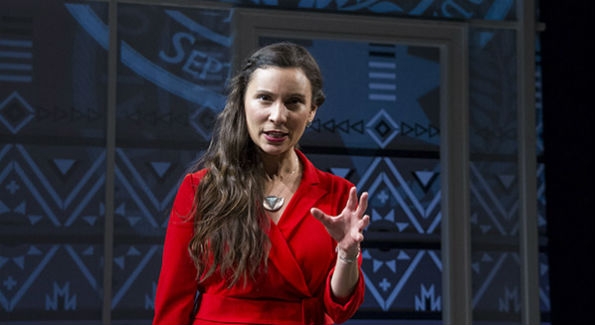Her political play, part of the Women’s Voices Theater Festival, addresses violence against Native women.

Kyla García (Sarah Polson) in Sovereignty, running January 12-February 18, 2018 at Arena Stage at the Mead Center for American Theater. Photo by C. Stanley Photography.
“I can’t think of anything…as revelatory as what we’ve just seen,” Gloria Steinem said after watching Mary Kathryn’s Nagle’s “Sovereignty” at Arena Stage. “What Mary Kathryn has given us tonight is the history we don’t learn.
”
Nagle’s powerful play, which takes place in the 1830s as well as present day, goes back and forth between two stories, that of her Cherokee ancestors (Nagle’s great-great-great grandfather, Major Ridge, served as the speaker of the Cherokee Nation Tribal Council, which established the Cherokee Nation Supreme Court) and that of a modern-day Cherokee lawyer fighting to restore her Nation’s jurisdiction after a violent crime.
We talked with Nagle about women in theater, her dual careers and the American history that’s not taught in schools.
How did the idea for this play come about and how did you get involved with Arena Stage?
Molly [Smith] commissioned me to write this play back in June 2015. Truthfully, I had been carrying this play in my heart for many years and had even attempted to write various scenes in law school and other early works. But I had never sat down to write it in its entirety until I was sitting in Molly’s office and she stated “isn’t the tribal jurisdiction provision in the Violence Against Women Act a modern day treaty between two sovereigns, Indian Nations and the United States?” I knew then and there that the time had come to write this play.
On the Women’s Voices Theater Festival, you’ve said that “We need this festival more than ever.
” Why is that?
We live in a country where only 22 percent of the plays produced in American theaters are written by women–but we make up roughly 50 percent of the population. In the midst of the #MeToo Movement, I think it’s important to reflect on why most women in the United States become, at some point in their lives, victims of sexual assault. Sexual assault is not about sex. It is about power. And who gets to tell stories and where in this country dictates who holds all power–including the power we need to grasp to dismantle a patriarchal framework that has commodified women’s lives and bodies.
Truly, sexual assault against women in the United States will not end until we regain the power to tell and share our own stories.
It seems that you have two very successful careers, as a lawyer and as a playwright. Do you find any similarities between the two worlds and how you approach your work?
The best lawyers are no different than the best playwrights: they tell compelling stories. Law is formed by narrative, facts and fictions we tell ourselves about what is right and wrong.
So, as a lawyer, if I want to advocate for a certain outcome under the law, I must first tell a compelling story. I’m still not sure what I love more–writing a brief or a play. I’m addicted to both and can’t imagine giving either up!
You’ve said you drew from family history to write this play. Did you discover anything about your family that you didn’t know before?
I’ve learned more about my family from watching the actors than from doing historical research. I wrote the words of my grandfathers into the play, their situations–the crises they navigated comprise every page. But watching the actors make choices each and every night, within the parameters of the words I have selected, has given my family life, a humanity that I always acknowledged but never viscerally experienced. When I sat down to write this play, I had no idea that watching the story of my grandfathers’ assassinations performed on stage could be so painful, or so healing.
What do you hope theatergoers will take away from the play?
The United States Constitution tells us that the treaties signed with Tribal Nations constitute the “supreme law of the land,” but very few Americans know anything about the more than 500 treaties that gave the United States the territory over which the country now rules. The history in my play is not just Cherokee Nation’s history– it’s American history. My hope is that Americans will leave with a desire to learn what, until now, American schools have determined we should not know.
“Sovereignty” runs through February 18 at Arena Stage.
